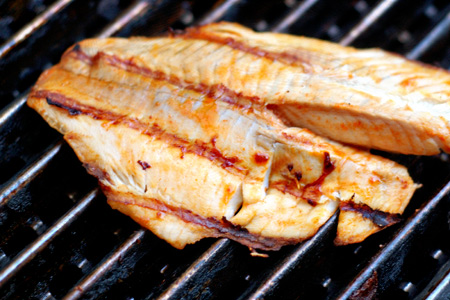Vitamins are substances containing carbon that an organism can’t produce on it’s own. While vitamins can be found in a variety of different foods, there are also supplements that can be taken such as daily vitamins, which cover many different kinds, and specific supplements, which are more concentrated, but have more of a specific kind of vitamin than daily vitamins. However, supplements are not quite as effective as getting vitamins through eating regular foods. Processed vitamins take out many of the important nutrients that can be gained from eating food that has those specific vitamins in them.
Vitamin
|
What does it
do?
|
Where can I
get it?
|
What happens
when there isn't enough?
|
A
|
Vitamin A
protects eyes, supports the immune system, helps cells grow, and helps keep
skin in good shape.
|
The best place
to get vitamin A is from dark green and orange vegetables, liver, and egg
yolks.
 |
Vitamin A
deficiency can cause blindness, a weaker immune system, which can make
infections and diseases more severe and can lead to death, and it can also
hurt a pregnant mother or even kill her.
|
C
|
Vitamin C
keeps gums, bones, & blood vessels healthy, helps the body to take in
minerals, helps wounds heal faster, helps with brain functions, and protects
against colds & diseases.
|
The best place
to get vitamin C is from citrus fruits, broccoli, Brussels sprouts,
strawberries, cantaloupes.
 |
Vitamin C
deficiency is a disease known as scurvy that can cause bleeding of the skin,
gums, and eyes, loosened teeth, swelling of the bones, fever, diarrhea,
weakness, and pathologic fractures (where a bone breaks for no real
reason).
|
D
|
Vitamin D
helps with bone structure because it helps the body to take in and accept
calcium better.
|
The best place
to get vitamin D is from fish, milk, and egg yolks. However, if our bodies
are in sunlight, we will make our own vitamin D without having to eat food
(but eating vitamin D rich foods can't hurt).
 |
Vitamin D
deficiency can cause several problems. It causes a disease known rickets.
Because vitamin D helps the body take in calcium, a lack of vitamin D can
make bones weak and even deformed. Vitamin D deficiency can also cause things
such as cancer, osteoporosis, and depression.
|
E
|
Vitamin E is
an antioxidant, so it protects cells by taking toxins such as toxic oxygen away
from them.
|
The best place
to get vitamin E is from nuts, dark green vegetables, and vegetable oils.
 |
The lack of
vitamin E can cause several things to happen to a person. Some things it can
cause are bad reflexes, ataxia, loss of eye control, or even loss of the
ability to walk.
|
Minerals
Minerals are substances that aren’t organic that an organism can’t produce on it’s own. Like vitamins, minerals can be obtained through daily or specific supplements, but it is more beneficial to be obtained through eating foods that contain that mineral.
Mineral
|
What does it
do?
|
Where can I
get it?
|
What happens
when there isn't enough?
|
Calcium
|
Calcium helps
to build bones and teeth and can help with nerves and blood clots.
|
Blood needs
calcium, but a lack of calcium won't affect blood calcium levels because when
there is a lack of calcium in a body, it will take calcium out of the bones
in order to keep the blood normal. Although, when the body takes calcium out
of the bones, it can lead to osteoporosis, which is where the bones are weak and
more susceptible to breaking.
|
|
Iron
|
Iron helps red
blood cells be more efficient in their job to deliver oxygen throughout the
body. Iron can also help white blood cells and the immune system.
|
The best place
to get iron is from red meat and green leafy vegetables.
 |
When the body
doesn't have enough iron, it causes a disease known as anemia that affects
the red blood cells. The red blood cell's job is to deliver oxygen in the
body, but when there isn't enough iron the body makes less red blood cells
and the ones that do get made aren't very efficient. Anemia can make a person
tire quickly, get out of breath, and even lead to heart problems. Generally
women are at a higher risk of anemia then men due to menstruation, which
causes women to loose red blood cells.
|
Magnesium
|
Magnesium
helps the body to make the bones strong, fix cells, and make energy and
protein.
|
The best place
to get magnesium is from whole grains, green leafy vegetables, and chocolate.
 |
Magnesium
deficiency can affect multiple parts of the body and can cause twitches and
spasms, sensitivity to light and noise, insomnia, restlessness, and tingling
feelings.
|
Zinc
|
Zinc helps
with the immune system, helps the body grow and function normally, and breaks
down macronutrients.
|
The best place
to get zinc is from meat, nuts, and whole grains.
 |
Zinc
deficiency can affect sight and hearing, make the immune system weaker,
stunted growth, and anemia.
|
Sources:


No comments:
Post a Comment